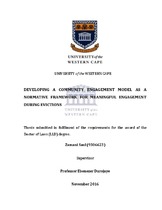| dc.contributor.advisor | Durojaye, Ebenezer | |
| dc.contributor.author | Saul, Zamani | |
| dc.date.accessioned | 2018-08-13T13:17:42Z | |
| dc.date.available | 2018-08-13T13:17:42Z | |
| dc.date.issued | 2016 | |
| dc.identifier.uri | http://hdl.handle.net/11394/6255 | |
| dc.description | Doctor Legum - LLD | |
| dc.description.abstract | The research problem of this study is the jurisprudential inconsistency in the application
of the right in section 26(3) of the South African Constitution's Bill of Rights. The
inconsistency is due to inadequate conceptualisation of the substantive requirements of
meaningful engagement (ME) by the South African Constitutional Court (ConCourt). The
central argument is that the development of a community engagement model based on the
substantive requirements of ME will enhance the application of section 26(3).
This study commences by illustrating the disempowering nature to the squatters of the
apartheid evictions in South Africa. To tighten influx control, the apartheid regime
introduced a battery of laws that disempowered the squatters. The apartheid-induced
disempowerment of the squatters penetrated into the democratic dispensation. In the
examination of the normative context of evictions post-1994, this study identifies six
primary drivers for substantive involvement of the occupiers during evictions. The six
primary drivers seek to address the disempowering trajectory during evictions. | |
| dc.language.iso | en | |
| dc.publisher | University of the Western Cape | |
| dc.subject | Democracy | |
| dc.subject | Empowerment | |
| dc.subject | Evictions | |
| dc.subject | Meaningful engagement | |
| dc.subject | Participation | |
| dc.subject | Rights to human dignity, equality and freedom | |
| dc.subject | Social capital | |
| dc.subject | Socio-economic rights | |
| dc.subject | Transformative Empowerment Model | |
| dc.subject | Unlawful occupiers | |
| dc.title | Developing a Community Engagement Model as a Normative Framework for Meaningful Engagement During Evictions | |
| dc.rights.holder | University of the Western Cape | |

